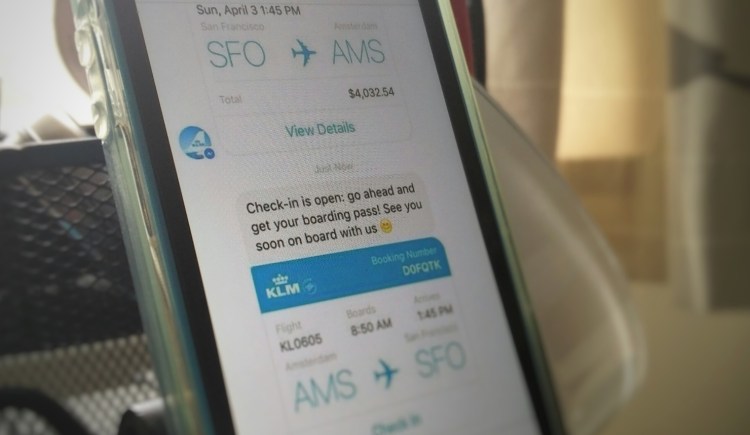Want smarter insights in your inbox? Sign up for our weekly newsletters to get only what matters to enterprise AI, data, and security leaders. Subscribe Now
Facebook and KLM airlines have formally announced a partnership that will allow KLM customers to receive flight confirmations, boarding cards, reminders, flight status updates, and customer service directly through the Facebook Messenger app.
At its F8 developer conference last year, the social networking giant first unveiled plans to expand Messenger beyond a simple messaging app and into a platform — one that can be used to power and underpin myriad third-party services. Retailers Everlane and Zulily were among the first partners announced, though it was later revealed that KLM would be added to the mix too.
The KLM rollout kicks off today, though neither party has revealed in what markets or to whom. However Messenger chief David Marcus did confirm that the feature would be available globally “in the coming days and weeks.”
KLM is one of the world’s biggest airlines, and this isn’t the first time it has dabbled with social networks. Back in 2014, the company launched a new service that let people pay through Facebook and Twitter. But bringing Messenger front and center could represent a major shift, not only for KLM, but in the way companies communicate with customers.
“The new Messenger service is a perfect addition to KLM’s social strategy,” said Pieter Elbers, KLM president and CEO. “We believe we should be where our customers are, and therefore Messenger and KLM are a good fit. Our customers feel comfortable sharing info with us via a more personal platform like Messenger.”
The new KLM Messenger service will be open to all customers who book tickets through KLM.com and who elect to receive information via Messenger — for context, KLM has more than 15 million “fans” on Facebook.
“Last year, we activated the Messenger button on our Facebook Page, allowing customers to contact KLM even more directly via private messaging,” continued Elbers. “Cases increased by 40 percent, which shows customers appreciate this form of communication. We are now taking our service to customers a step further, offering them the option of receiving all relevant flight documents and information in a single Messenger overview.”
Facebook made the unpopular move back in 2014 to chisel Messenger out from the main Facebook experience, meaning friends require two separate apps — one for private messaging and one for general networking. But Facebook’s grand plan to turn Messenger into a platform in itself was given a boost when Facebook Messenger uptake soared, with more than 800 million people currently using the app each month.
The Messenger Platform launched with a number of apps and developers on board, and Facebook has also ushered in a number of retailers, giving a glimpse into what a Messenger-powered customer service portal would look like. Clothing retailer Everlane was one of these early retailers.

Above: Everlane & Messenger
In short, Facebook wants Messenger to be the go-to platform for communicating — whether between friends or between businesses and customers. And Facebook’s advances here could go some way toward achieving its broader ambition of killing good ol’ fashioned email. With Messenger, all communications are visible and centralized for both parties so they will always be able to see chat histories.
In an interview with VentureBeat back in November, Julien Codorniou, Facebook’s global director of platform and partnerships, said that airlines were pivotal to Facebook’s Messenger push. But why? “It’s a scenario people can relate to — when you have to change a plane ticket on the go, it’s not easy to call these companies,” explained Codorniou.
What Facebook is trying to create with Messenger is to almost a little subset of the Web — a walled garden where everything takes place, from transferring money to friends to searching and paying for flights, without really having to leave Messenger. It’s not quite the “One app to rule them all” yet, given that you’re not yet able to pay for flights directly through Messenger, but that’s certainly on the agenda, and we’re already seeing a similar scenario with other popular messaging apps, such as WeChat in China.


